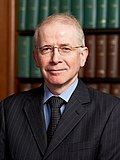| Deputy President of the Supreme Court of the United Kingdom | |
|---|---|
since 12 January 2026 | |
| Supreme Court of the United Kingdom | |
| Style | The Right Honourable (within the UK and the Commonwealth) My Lord/Lady (when addressed in court) |
| Status | Deputy Chief Justice |
| Seat | Middlesex Guildhall, London |
| Appointer | The Monarch on the advice of the Prime Minister following the Secretary of State for Justice's approval of a recommendation |
| Term length | Life tenure; may be removed on the address of Parliament [1] |
| Constituting instrument | Constitutional Reform Act 2005 |
| Precursor | Second Senior Lord of Appeal in Ordinary |
| Formation | 1 October 2009 |
| First holder | The Lord Hope of Craighead |
| Salary | £206,857 [2] |
| Website | www |
| This article is part of a series on |
| Politics of the United Kingdom |
|---|
 |
The deputy president of the Supreme Court of the United Kingdom is the second most senior judge of the Supreme Court of the United Kingdom, after the president of the Supreme Court. The office is equivalent to the now-defunct position of Second Senior Lord of Appeal in Ordinary , also known previously as the Second Senior Law Lord, who was the second highest-ranking Lord of Appeal in Ordinary.
Contents
- List of Second Senior Lords of Appeal in Ordinary
- List of deputy presidents of the Supreme Court
- References
- External links
By Royal Warrant of Queen Elizabeth II published on 1 October 2009, a place for the deputy president of the Supreme Court in the order of precedence was established: the deputy president of the Supreme Court ranks after the Master of the Rolls and before the other justices of the Supreme Court. [3]








